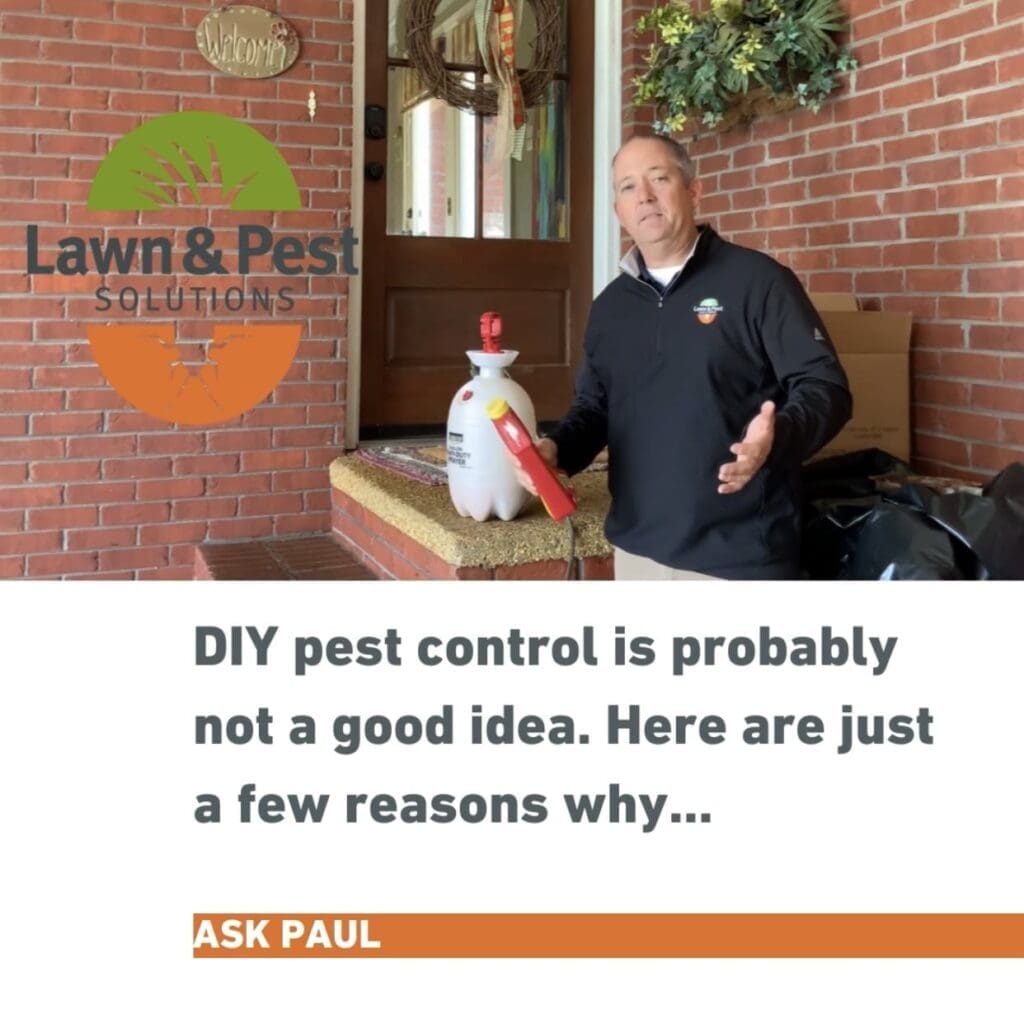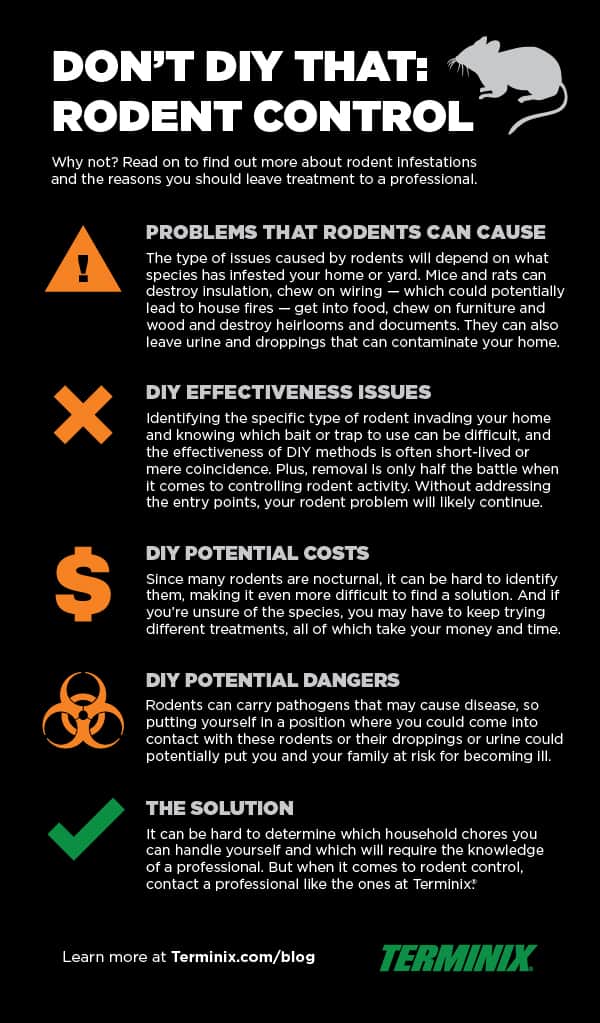Are you tired of dealing with pests in your home? It’s tempting to take matters into your own hands and try some DIY pest control methods. However, before you grab that can of bug spray or set up a homemade trap, there are some important things you should know. In this article, we will explore the dangers of DIY pest control and why it’s crucial to have professional help. By understanding the risks involved, you can make informed decisions that will keep your home pest-free and safe for you and your family.

Health risks of DIY pest control
Exposure to harmful chemicals
When you take on the task of pest control yourself, you expose yourself to harmful chemicals that can have serious health implications. Many DIY pest control products contain toxic substances that can be harmful if breathed in or absorbed by the skin. This can lead to various health problems, ranging from mild irritation to more severe conditions.
Respiratory issues
Using DIY pest control products without proper knowledge and precautions can also result in respiratory issues. Inhaling the fumes and particles from these products can irritate your respiratory system, leading to symptoms such as coughing, wheezing, and shortness of breath. In some cases, these respiratory issues can persist and become chronic.
Skin irritations
The chemicals found in DIY pest control products can cause skin irritations upon contact. Skin rashes, redness, and itching are common symptoms experienced by individuals who handle these products without proper protective measures. It is important to remember that different people have different sensitivities to these chemicals, and some may experience more severe skin reactions.
Allergic reactions
For individuals with allergies, DIY pest control can pose even greater risks. Some people may have allergies to specific pest control chemicals, and exposure to these substances can trigger allergic reactions. These reactions can range from mild symptoms, such as itching and hives, to severe allergic reactions that may require immediate medical attention.
Ineffectiveness of DIY pest control
Lack of expertise and knowledge
While DIY pest control may seem like a cost-effective solution, it often lacks the necessary expertise and knowledge required to effectively eliminate pests. Pest control professionals undergo extensive training and have a deep understanding of pest behavior, biology, and effective eradication methods. Without this knowledge, your DIY efforts may fall short and fail to address the root cause of the infestation.
Incomplete pest eradication
Another drawback of DIY pest control is the possibility of incomplete pest eradication. Pest infestations can be complex, and without proper expertise, it can be challenging to completely eliminate pests from your property. Inadequate pest control measures can result in pests hiding in hard-to-reach areas or regrouping and reinfesting your property shortly after treatment.
Risk of infestation recurrence
DIY pest control methods often lack the preventive measures necessary to avoid future infestations. Professionals not only eliminate-existing pests but also implement long-term preventive measures to minimize the chances of reinfestation. Without this foresight and expertise, you may find yourself facing a recurring pest problem, leading to frustration and potentially more damage to your property.
Property damage caused by DIY pest control
Structural damage
One of the unintended consequences of DIY pest control is the potential for structural damage to your property. Some pests, such as termites, can cause significant damage to the wooden structures of your home. Without proper knowledge and tools, DIY pest control may not effectively target these pests, allowing them to continue damaging your property.
Contamination of food and water
Using the wrong pest control products or applying them incorrectly can lead to contamination of your food and water sources. This can pose serious health risks to you and your family. Additionally, pests themselves can contaminate food and water with their droppings, urine, and pathogens they carry. Professional pest control services can ensure the safe elimination of pests without compromising the safety of your food and water supply.
Damage to furniture and belongings
Certain pests, such as rodents, can cause damage to your furniture, upholstery, and belongings. DIY pest control methods may not effectively address these pests, leaving your valuable items at risk. Professionals have the experience and knowledge to eliminate these pests effectively and provide recommendations to prevent future damage.
Safety hazards of DIY pest control
Injury risks
DIY pest control can pose various injury risks, especially when dealing with pests that can bite, sting, or scratch. Inexperienced individuals may unknowingly provoke pests, leading to bites or stings. Additionally, using equipment and tools without proper training and precautions can result in accidents and injuries. Professional pest control services have the necessary equipment and expertise to handle pests safely, minimizing the risk of injury.
Risk of fire or electrical hazards
Some pest control methods, such as fogging or using heat treatments, can increase the risk of fire or electrical hazards when not done properly. Inadequate use of equipment or failure to follow safety protocols can result in accidents that pose a danger to both your property and your personal safety. Hiring professionals ensures that these potentially hazardous situations are avoided.
Improper use of equipment
DIY pest control often involves the use of various equipment and tools, such as sprayers, traps, or pesticides. Improper use of these tools can not only be ineffective against pests but can also lead to unintended consequences. Mishandling pesticides or using equipment without proper precautions can result in accidents, exposure to toxic substances, or environmental damage.

Environmental impact of DIY pest control
Contamination of soil, air, and water
DIY pest control products often contain chemicals that can have a negative impact on the environment. If not used or disposed of correctly, these chemicals can contaminate the soil, air, and water sources. This contamination can harm beneficial insects, animals, and plants, disrupting the delicate balance of the ecosystem.
Harm to beneficial insects and animals
Pests are not the only creatures that can be affected by DIY pest control methods. Beneficial insects, such as bees and butterflies, play a vital role in pollination and maintaining a healthy ecosystem. Using certain pesticides indiscriminately can harm these important species, leading to a decline in their populations and an imbalance in the natural environment.
Disruption of ecosystem balance
The use of DIY pest control methods without proper consideration for the ecosystem can disrupt the natural balance. Pests, although unwanted, are a part of the natural food chain and ecosystem. Eliminating them without a holistic approach can have unintended consequences, such as an increase in other pests or the loss of natural predators. Professional pest control services take into account ecosystem dynamics and implement measures that minimize disruptions.
Legal and regulatory issues related to DIY pest control
Violation of local ordinances and regulations
DIY pest control without proper knowledge and adherence to local ordinances and regulations can result in legal complications. Some areas have specific guidelines for the use of pesticides and pest control methods to protect the environment and public health. Failure to comply with these regulations can lead to penalties and legal consequences.
Improper disposal of chemicals
The disposal of pest control chemicals is regulated to prevent environmental contamination and harm to humans and animals. DIY pest control often lacks the knowledge of correct disposal methods, leading to improper handling and disposal of these toxic substances. This can result in legal ramifications and environmental damage. Professional pest control services are well-versed in proper disposal practices, ensuring compliance with regulations.

Cost implications of DIY pest control
Potential for increased costs
While DIY pest control may appear cost-effective at first, it can often result in increased costs in the long run. Incomplete pest eradication can lead to recurring infestations, requiring additional treatments and expenses. Additionally, damage caused by pests can be expensive to repair or replace, especially when DIY methods fail to address the root cause of the problem.
Need for repeat treatments
DIY pest control methods may not provide a lasting solution to pest problems, necessitating the need for repeat treatments. These additional treatments can add up in terms of both time and money. Professional pest control services focus on providing long-term solutions, reducing the need for repeat treatments and saving you from unnecessary expenses.
Additional expenses for repair and restoration
If DIY pest control fails to effectively eliminate pests or leads to property damage, you may be faced with additional expenses for repairs and restoration. Structural damage caused by pests can be costly to fix, and contamination of food and water sources may require professional cleaning services. By hiring professionals, you can avoid these additional expenses and ensure a comprehensive solution.
Benefits of hiring professional pest control services
Expertise and experience
One of the primary advantages of hiring professional pest control services is their expertise and experience in dealing with various types of pests. Pest control professionals undergo rigorous training and continuously update their knowledge on the latest pest control techniques and products. Their expertise allows them to accurately identify pests and implement targeted treatments for effective eradication.
Proper identification and eradication of pests
Effective pest control starts with proper identification. Professionals can accurately identify the specific pests infesting your property and determine the most suitable treatment methods. They have access to a wide range of specialized products and equipment, ensuring the eradication of pests without compromising your safety or the environment.
Long-term preventive measures
Another benefit of hiring professionals is their ability to implement long-term preventive measures. They assess the underlying causes of pest infestations, such as entry points or conducive conditions, and provide recommendations to address these issues. By addressing the root cause and implementing preventive measures, professionals can help minimize the risk of future pest infestations.

Factors to consider before hiring professional pest control services
Cost considerations
Before hiring professional pest control services, it is important to consider the cost implications. Different companies may have varying pricing structures, so it is essential to obtain multiple quotes and compare the services offered. While cost is an important factor, it should not be the sole determining factor. The expertise, reputation, and effectiveness of the service provider should also be taken into account.
Recommendations and reviews
When choosing a professional pest control service, it is advisable to seek recommendations from trusted sources, such as friends, family, or neighbors who have used their services. Additionally, reading online reviews and testimonials can provide valuable insights into the experiences of past customers. This information can help you make a more informed decision and choose a reputable and reliable service provider.
Insurance and guarantees
It is important to ensure that the pest control service provider carries appropriate insurance coverage. This protects you from any liability in the event of accidents or damages that may occur during the treatment process. Additionally, inquire about any guarantees or warranties offered by the company. A reputable service provider will stand behind their work and offer guarantees for their services.
Eco-friendly and safe practices
If you have concerns about the environmental impact of pest control, look for service providers that prioritize eco-friendly and safe practices. Many companies now offer alternative pest control methods that minimize the use of harmful chemicals while still effectively eliminating pests. Inquire about their approach to pest control and their commitment to environmental sustainability.
Conclusion
In conclusion, DIY pest control may seem like a convenient and cost-effective solution, but it comes with several risks and drawbacks. The health risks associated with exposure to harmful chemicals, ineffectiveness in eradicating pests, property damage caused by improper pest control methods, safety hazards, environmental impact, and legal and regulatory issues should not be overlooked.
Hiring professional pest control services offers numerous benefits, including their expertise and knowledge, proper identification and eradication of pests, and long-term preventive measures. However, it is important to consider factors such as cost, recommendations and reviews, insurance and guarantees, and eco-friendly practices before making a decision.
By understanding the risks associated with DIY pest control and making informed decisions, you can effectively manage pest infestations and ensure the safety and well-being of your property, yourself, and the environment.


I am Randy, the author behind PestControld.com. Drawing from decades of experience, I aim to provide valuable insights, expert advice, and practical recommendations to help you make informed decisions when assessing viable pest control solutions.